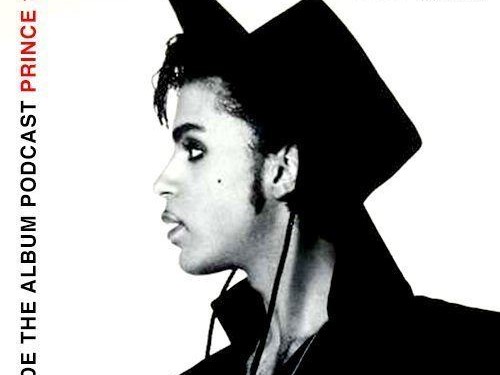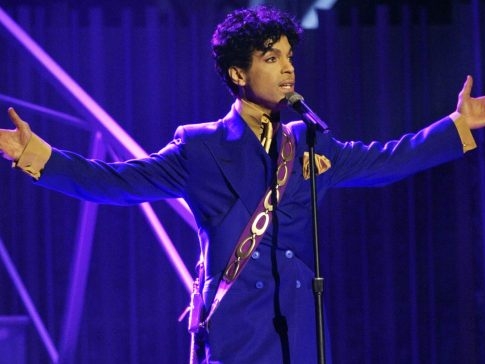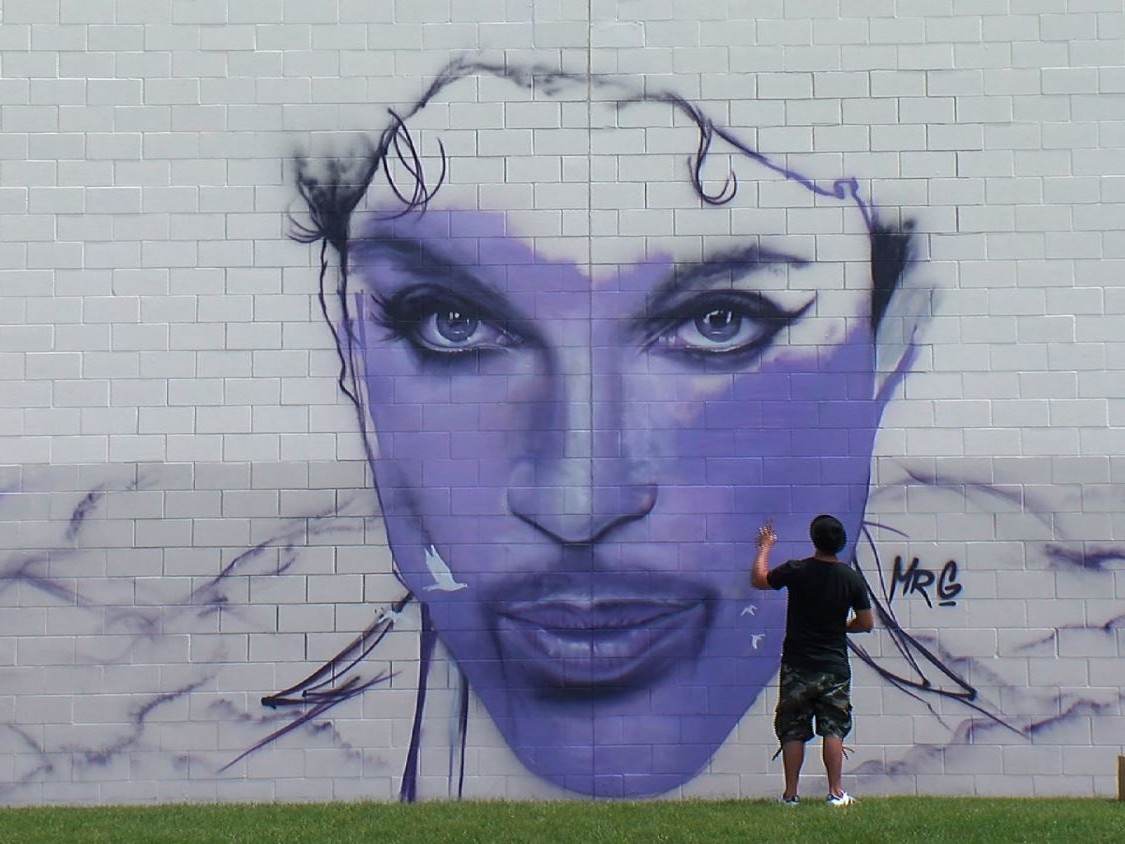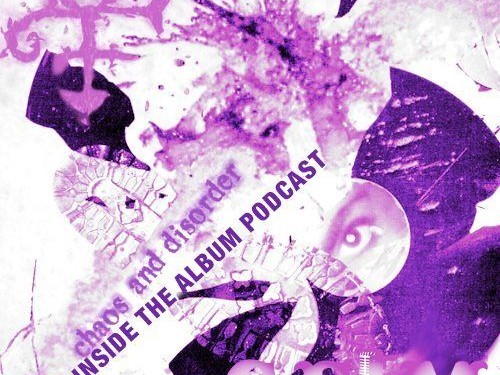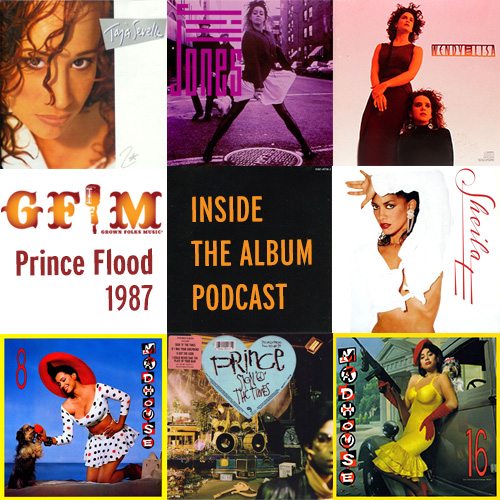
Growns, the following insightful and inspiring commentary was submitted by Nikki Giannini who we are grateful that our paths have crossed(via the incomparable DJ Polished Solid) through her phenomenal support of our Prince Podcast series and other content from GFM. It is quite humbling for the team that Nikki would take the time to provide us with this quality content that will serve as a critical companion to this episode of the series. If you are reading this and you have not had the opportunity make sure to check out the Prince Flood 1987 Podcast.
“This is gonna be a long night…A little bit longer afternoon” – Prince
What a gift! Prince Scholars Zaheer Ali and Harold Pride along with De Angela Duff and Ricky Wyatt dive deep into the waters of the Prince Flood 1987! That Zaheer, Harold and De Angela were presenters at the first academic “Purple Reign Conference” in Manchester, England is as exciting as it gets. Make no mistake…this is no dry lecture. It’s a lively, often hilarious, debate exploring a year in which Prince opened the floodgates, releasing so many projects that, in Zaheer’s opinion, “he established a dominion of Prince”.
I was longing to attend, so I love that you opened the podcast by talking about the Conference and the experience of being there. The way Zaheer connected the idea that not all presenters were “credentialed academics” as a “reflection of Prince’s belief in human potential” was brilliant, and his relief that Prince’s legacy as a Black artist was not being suppressed was well grounded in historical context (i.e. the communities Prince came out of, the music he experienced and the political aspects of his music). Zaheer’s conclusion that the Conference was important in establishing “Prince Critical Studies” was co-signed by Harold who emphasized the importance of continuing to think and talk about Prince’s legacy.
As a Lovesexy scholar, whose topic was “The Band With No Name”, I would love to have heard more detail about Harold’s presentation. Based on his insightful comments during the podcast, I can imagine why it was the one presentation De Angela didn’t want to miss.
I’m so glad Harold asked De Angela to talk about her presentation. I’m intrigued by her thesis comparing Prince’s persona in “Purple Rain as a construction of how Prince wanted his audience to see him (mysterious, brooding, sexy) versus his persona in “Under The Cherry Moon”, in which Christopher Tracy is the most authentic persona of the real Prince (he had a great sense of humor). The only thing I knew about UTCM was that it bombed in theaters!!? When I finally saw the movie I was amazed by how beautifully it was filmed and how hilarious it was. Even though it was very French, it took me back to the 1930’s black and white romantic comedies I adored as a kid. Those films where the costumes and sets were so elegant, and everyone was ever so witty. Prince captured that feeling beautifully in every detail, right down to that endearing “pin curl” on his forehead. And witty…Prince was wicked witty! AND he could act (something that doesn’t get nearly enough attention). Following up on what Zaheer said earlier, it’s not lost on me that those 30’s films were presented through a White lens. In UTCM Prince takes this film genre and turns it around, celebrating his identity as a Black artist (director/actor)… Black men are the lead characters… the Wrecka Stow scene…and one of my favorites… when referring to his bandana, Mary asks Christopher with distain, “What’s that?” His answer is quick, subtle and pure perfection (you’ll just have to watch ;-). I love UTCM. It’s a masterpiece. So I HAVE to hear your thesis, De Angela. Presentation at NYU? 😉
On to the Prince Flood. I don’t even know where to begin. I usually like to listen to the entire album(s) being discussed before commenting, but in this case it was impossible. Of course SOTT is in a category by itself and Jill Jones’ debut was already a favorite (thanks to an earlier Inside The Album podcast). As for the other releases, I’d only heard a bit of Madhouse 8 and a bit of The Family.
Because of the discussion about Prince’s break with The Revolution… and Wendy and Lisa in particular…I wanted to listen to the entire Wendy & Lisa debut. Harold brought up that Wendy played bass on Mountains and Honeymoon Express, and De Angela pointed out how magnificent Wendy’s guitar solo was on Waterfall. I was surprised to find that Wendy’s full credits included guitar, bass, drums, percussion, drum programmer, mixing engineer and more (talk about human potential). Zaheer added that “every single song on this album is about Prince.” The lyrics on Song About are undeniable:
So strange, that no one stayed
At the end of the *parade*
This is just another song about *it* (not you…it)
You were singing songs
About life or doom
Oh…break my heart. Then to follow with Chance To Grow? I love this beautiful, bittersweet album and I’m so glad I was listening for these details, which I might otherwise have missed. That’s what makes these panel discussions so valuable. Listening to the music becomes so much more meaningful.
This leads me to why I busted my budget for a Madhouse 8 CD. In truth, it had been on my mind because De Angela has often expressed her admiration for it, but this was the final push. Everyone was talking about the significance of the “America” video and De Angela said it was the first time we actually see Prince performing on drums. Eventually, this led to Harold saying “how *exquisite* Prince’s drum playing was on Madhouse 8… how Prince had the ability hear a fully formed song and leave space for himself in the music… how he had the ability to see a fully realized picture before it was painted.” This was such a beautiful, evocative description, and somehow that word…exquisite…in reference to Prince, just grabbed my heart. I stopped the podcast, streamed it and just listened. I was gone! Immediately searched online and bought it…not even a second thought. Thank you, Harold. I don’t regret it.
When I came back to the podcast (and my senses) Ricky had joined the group. Harold and Ricky continued to explore the virtues of Madhouse 8…Yay! Ricky said that Madhouse 8 and Madhouse 16 highlight Prince’s growth as a musician…how he was stretching… experimenting with more intricate instrumental arrangements. De Angela added that Madhouse 8 “is the most important record of Prince as a musician.” In comparing the two, she clarified the difference… “16” is a collaboration of several musicians, while “8” is just Eric Leeds and Prince. I let that sink in for a minute…just the two of them…Eric on horns and Prince on…everything! Amazing.
An aside: I’m playing Madhouse 8 in the car (‘cause I can’t stop) and my friend Eid gets in and, after a few minutes says (with awe in his voice), “what IS this!!?” I’m in seventh heaven.
I think I recited verbatim everything I learned from all of you. Eid just keeps saying, “Oh my God, this is beautiful.” Prince’s music touches another soul… and his legacy carries on.
Hmm…this is getting dangerously long. The only person who might still be reading is
De Angela. So I’ll jump to the debate about “Baby, You’re A Trip” because I love it. This is a short synopsis of a very lively exchange (don’t miss it). Harold and Zaheer are agreeing that this song is “one of Prince’s Blackest moments”, that it’s “straight up church” and Prince’s screams are representative of the ecstatic… almost Pentecostal. But De Angela is having none of it. She loves Jill Jones’ version. Then she drops my favorite line, “Jill is the only one who can out scream Prince…and Jill can scream in key!” Over and out guys.
The discussion about Jill’s debut album and why its release was delayed four years (!) is wide- ranging and heartbreaking. De Angela plays the opening of “Mia Boca” with Clare Fisher’s lush strings and then Jill’s gorgeous voice appears as if from the heavens. No wonder Prince didn’t want to let her go. I find these quotes from a Soulhead article so poignant:
“In the canon of Paisley Park artists, Jill Jones was the best.” – Michael A. Gonzales
“Jill Jones is the Prince protégé who sounds most thoroughly like herself.” – David Hill
I don’t feel that the “flood” hurt Jill’s debut. Her sound was too unique and, by most accounts, has stood the test of time 30 years later. But it seems reasonable that in “real time” it was hurt by WB lack of interest. According to Alan Leeds, “Paisley Park projects were totally dependent on WB interest in distribution, which wasn’t that great.”
Zaheer circled back to something he mentioned at the beginning of the podcast. The discussion was about the success or lack of success of all these projects. His view is that it depends on how we define success. In his experience, DC Black radio was playing ALL the music Prince was releasing which created a “different kind of currency”. He explained how Prince occupied the aural space in 1987 “establishing a dominion of Prince” and how this would allow him to do projects he wanted to do later on. He went on to say that ‘87 was a key turning point in Prince’s career and that these projects were “not so much a flood, but a dam being released.” With this kind of insight I can’t wait for Zaheer’s princesyllabus.com to launch!
At this point I realize that there IS such a thing as taking too many notes, and I feel like I’m chasing my own tail. Most likely I’m out of sync in chronology, but hopefully I’m keeping the themes of the podcast coherent. For example, I don’t remember where this came in, but Harold’s observation that Prince often ended a song in a way that led beautifully to the beginning of the next song was a revelation. He illustrated how “Grand Slam” leads to “Anna Stesia” and how the funky rhythm guitar at the end of “You Got The Look” prepares us for “If I Was Your Girlfriend”. I know I’ll be listening for these transitions in many other songs.
Ricky really started the fires going by introducing the question of’ the importance of
‘84 vs. ’87. This was a passionate debate filled with strong opinions, humor and good-natured ribbing. There were persuasive opinions all around, but I agree with Ricky. Although ’87 was more significant musically, it probably wouldn’t have been possible without the explosion of “Purple Rain” in ’84. This led to a discussion about where to start newbies. I see this question a lot. I connected with De Angela’s point that “it depends on age and whether or not you experienced Prince in real time” because this is exactly where I land.
I was born 3 years before Prince and by chance ended up following a lot of the same music he did (Sly, Santana, Stevie, the list goes on). But as a 12 year old, the musician who turned my world upside down was Jimi Hendrix. Those years from 1967 through 1979 were my musical coming of age and it was a paradise. So when Harold compared SOTT to Songs In The Key Of Life in terms of the “wealth of material and level of genius”, I was floored. He connected Prince to where I come from musically.
Unfortunately, Prince wasn’t the soundtrack of my life. I came to him with “Controversy” and by the time “Purple Rain” hit I was a mom with a 7 month-old son. I loved every hit song Prince had, but my exposure to his music was limited to radio. It pains me to admit I was a casual listener.
When I heard Prince was gone I was devastated, and somehow I could feel that this wasn’t going to pass. What I couldn’t comprehend was where this deep, very real grief was coming from. If it’s this profound for me, I can’t begin to imagine the grief you’re all experiencing. Not a day has passed that I haven’t listened to his music. I’ll be “mining the treasure” for many years to come.
Nikki Giannini
RELATED POSTS
June 16, 2016
GFM Inside The Album Podcast – Prince 1986
July 20, 2014
Prince
June 22, 2016
Prince Mural In Chanhassen
February 16, 2010


